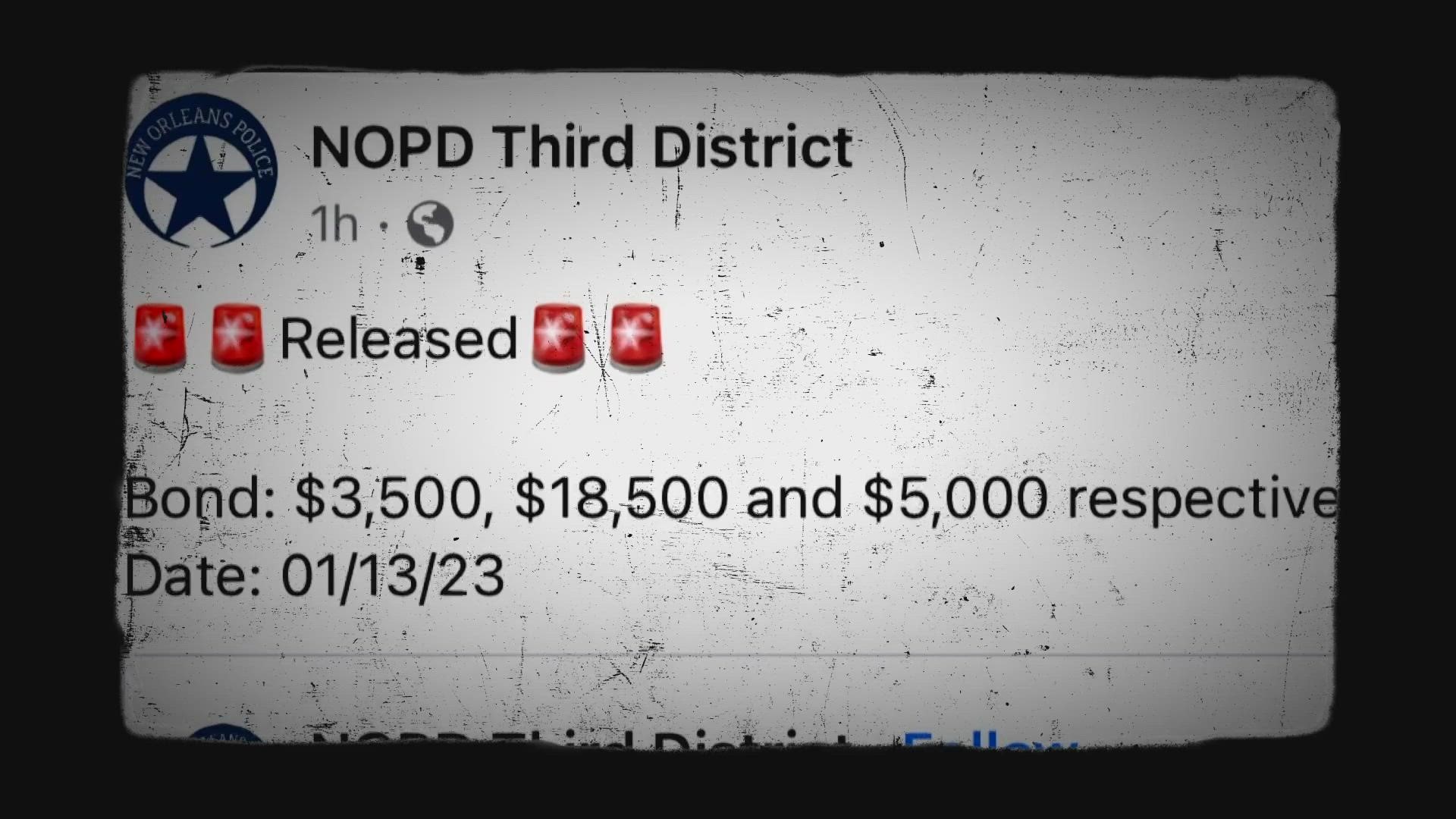NEW ORLEANS — New Orleans District Attorney Jason Williams, a career criminal defense attorney, took office in 2021 as a reformer. But as a prosecutor, Williams quickly learned that the system to keep the city safe is only as strong as its weakest link.
As we've seen in some high-profile cases, that weak link is sometimes bail low enough to allow repeat offenders to stay on the street without any restrictions as they await trial. For example, John Honore, now facing a murder charge in the carjacking that cost 73-year-old Linda Frickey her life, had racked up seven arrests and 25 separate charges before he turned 18, but was not kept in custody.
WWL-TV also revealed the recent case of Keni Landix, a 20-year-old released on minimal bail restrictions after four felony arrests in three months, before police say he escalated to armed robbery on Jan. 25. He is now being held on a bail of $250,000.
“Criminal justice reform doesn't mean letting people out of jail, it means holding them accountable and putting them in jail,” Williams said at a press briefing in 2022.
Frustrated New Orleans police officers have now taken to social media to track bail amounts for suspects they arrest multiple times.
Even DA Williams is changing the posture he adopted right after taking office, which was to remain neutral at bail settings. Now, not only are prosecutors arguing for bail, they are returning to court to request bail increases for certain repeat offenders.
Ebony Williams, 31, qualifies as a repeat offender. Her rap sheet shows multiple convictions going back to 2009, including . Those led to several stretches on probation in both Jefferson and Orleans parishes, and at least two prison terms.
So after Williams’ multiple new arrests in New Orleans on domestic violence and home invasion charges, the court ordered her into an electronic monitoring program. In those cases, she's accused of breaking down a door, beating a woman, and threatening victims with a knife and a gun.
Williams was recommended for monitoring due to her criminal history and multiple missed court appearances. She was rated as a 5 out of 5 on the risk assessment matrix used by New Orleans criminal court to help judges and magistrates set appropriate bail and conditions. That score comes with a recommendation for “maximum supervision if released.”
Supervision was provided by the electronic monitoring company ASAP, Assured Supervision Accountability Program.
“I believe that in this case when you look at that list of charges that Ms. Williams is definitely someone that should be monitored,” said Jill Dennis, ASAP owner and operator.
Williams was booked again last year with domestic abuse aggravated assault with a dangerous weapon. And while her bail was set at a modest $2,000, her supervision was tightened to include the ASAP bracelet, curfew and multiple stay-away orders.
The restrictions didn't appear to slow her down, records show. Twice she was arrested for violating those stay-away orders, most recently in November, but each time she was released on the same conditions.
“The judge put a curfew on her, and she wasn't abiding by that curfew,” Dennis said. “She just did not want to comply with what the court had ordered her to do.”
The judge presiding over Williams’ cases is 20-year veteran Darryl Derbigny. Court records show that ASAP routinely filed violation reports for Derbigny, but the judge took no action.
Rafael Goyeneche, president of the Metropolitan Crime Commission, a non-profit criminal justice watchdog group, questioned the point of court-ordered restrictions if the judge doesn’t act on violations.
“The police did their job. They followed their policies and best practices,” Goyeneche said. “But the judge didn't do his job.”
According to the docket entries in Williams’ cases, Derbigny did respond to the violations on Jan. 12 by issuing a “zero-tolerance policy.”
But all of that changed six days later.
When the three different bail companies who bonded Williams out of a jail surrendered those bonds, dropping her as too risky a client, Derbigny did an about-face.
Court records show he reduced her accumulated bail amounts from over $20,000 down to $800. Prosecutors objected, but Derbigny stuck to his decision. Williams promptly paid her new lower bail, and was released again.
Goyeneche called Derbigny’s decision “indefensible.”
“This type of poor decision-making I think is reflective of a judge that is either negligent or indifferent,” Goyeneche said.
Judge Derbigny took his position one step further. In addition to slashing her bail, court records show he also released Williams from her ankle monitor. Court records don't reflect the reasons Derbigny reversed himself, and neither he nor court administrators have responded to calls for comment.
“This ought to be something that the Louisiana Supreme Court takes up to determine if there is judicial misconduct involved here,” Goyeneche said. “They can institute an investigation based on the information that you're presenting.”
WWL-TV reached out to Williams' attorney, Rudy Gorrell, but he declined to comment. Williams was due back in court on February 2, but court records don't reflect what happened, including if Derbigny even held court on that date.
The records also don't show any new violations by Williams. Her next step in court is a pre-trial hearing on the multiple charges against her.

